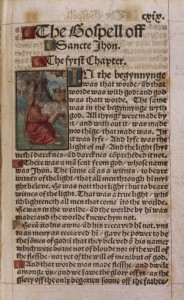David Teems' book, "Tyndale: The Man Who Gave God an English Voice" is a biography about William Tyndale who pioneered the translation of the Holy Bible into modern English. The first widely circulated English translation of the bible was written in Middle English by John Wycliffe in the 14th century. The Tyndale Bible was the first bible translated into Modern/Pre-Modern English and the first to be widely circulated due to the printing press in the 16th century. Tyndale is credited with investing a large number of words commonly used in English vernacular even today, and all English Bible translations still retain verbatim translations sourced from Tyndale's Bible. The influence of Tyndale on the English Language and culture cannot be understated. This book is about Tyndale, his translation and similar works.
Overall, I am dissatisfied by this biography because (although it provides the information I was desiring to know about William Tyndale) it is unfortunately disorganized and distracted by contemporary events to Tyndale's era that could have been removed without diminishing the biography, and more importantly, the relationship between Tyndale and Wycliffe was not explained until the end of the book. It's a light and easy read that I finished in about a day, and its important that the book is read in entirety because some of the obvious questions about Tyndale is answered at the end of the book instead of the beginning. So if you quit reading this book then you'll miss significant facts. One of which is that Tyndale didn't die for translating the bible into English, but for other reasons that you'll have to read to learn.
 The book contains some helpful information about Wycliffe, including that he as dug up after death and then burned in anger to his bible translation. It's not technical, so anyone may read this book, and it does provide a concise book on an important part of Church history. The abbreviations were not used consistently and often in an a confusing way, especially with "H8" which referred to Henry VIII. However, I really enjoyed Teem's list of words that Tyndale invented, and these lists more than anything proved Tyndale's influence on us all. I also enjoyed reading the original translations, and the jib-jabs at thought-for-thought translations of today (which I despise). Lastly, the book contains minimal information but very important none-the-less about the printing press, which was what made Tyndale so influential. And although the contemporary events are distracting, they are helpful in understanding Tyndale's era.
The book contains some helpful information about Wycliffe, including that he as dug up after death and then burned in anger to his bible translation. It's not technical, so anyone may read this book, and it does provide a concise book on an important part of Church history. The abbreviations were not used consistently and often in an a confusing way, especially with "H8" which referred to Henry VIII. However, I really enjoyed Teem's list of words that Tyndale invented, and these lists more than anything proved Tyndale's influence on us all. I also enjoyed reading the original translations, and the jib-jabs at thought-for-thought translations of today (which I despise). Lastly, the book contains minimal information but very important none-the-less about the printing press, which was what made Tyndale so influential. And although the contemporary events are distracting, they are helpful in understanding Tyndale's era.
We are a people who firmly believes in bible translation, and to understand the family tree of English Bible Translations requires knowledge of William Tyndale.
Do I recommend this book? If you want a biography on William Tyndale, it has useful information and its a quick read, so as long as its read in entirety it will do the job. If you want to read a good biography, I recommend George Marsden's "Jonathan Edwards: A Life" as a biography done right, or last year's best seller by Eric Metaxas' "Bonhoeffer: Pastor, Martyr, Prophet, Spy: A Righteous Gentile Vs. The Third Reich", as a better place to begin.
Disclosure of Material Connection: I received this book free from the publisher through the BookSneeze®.com book review bloggers program. I was not required to write a positive review. The opinions I have expressed are my own. I am disclosing this in accordance with the Federal Trade Commission’s 16 CFR, Part 255 : "Guides Concerning the Use of Endorsements and Testimonials in Advertising."
Related: bible, bible translation, Biography, Book, history, john wycliffe, Review, Translation, william tyndale




Leave a comment